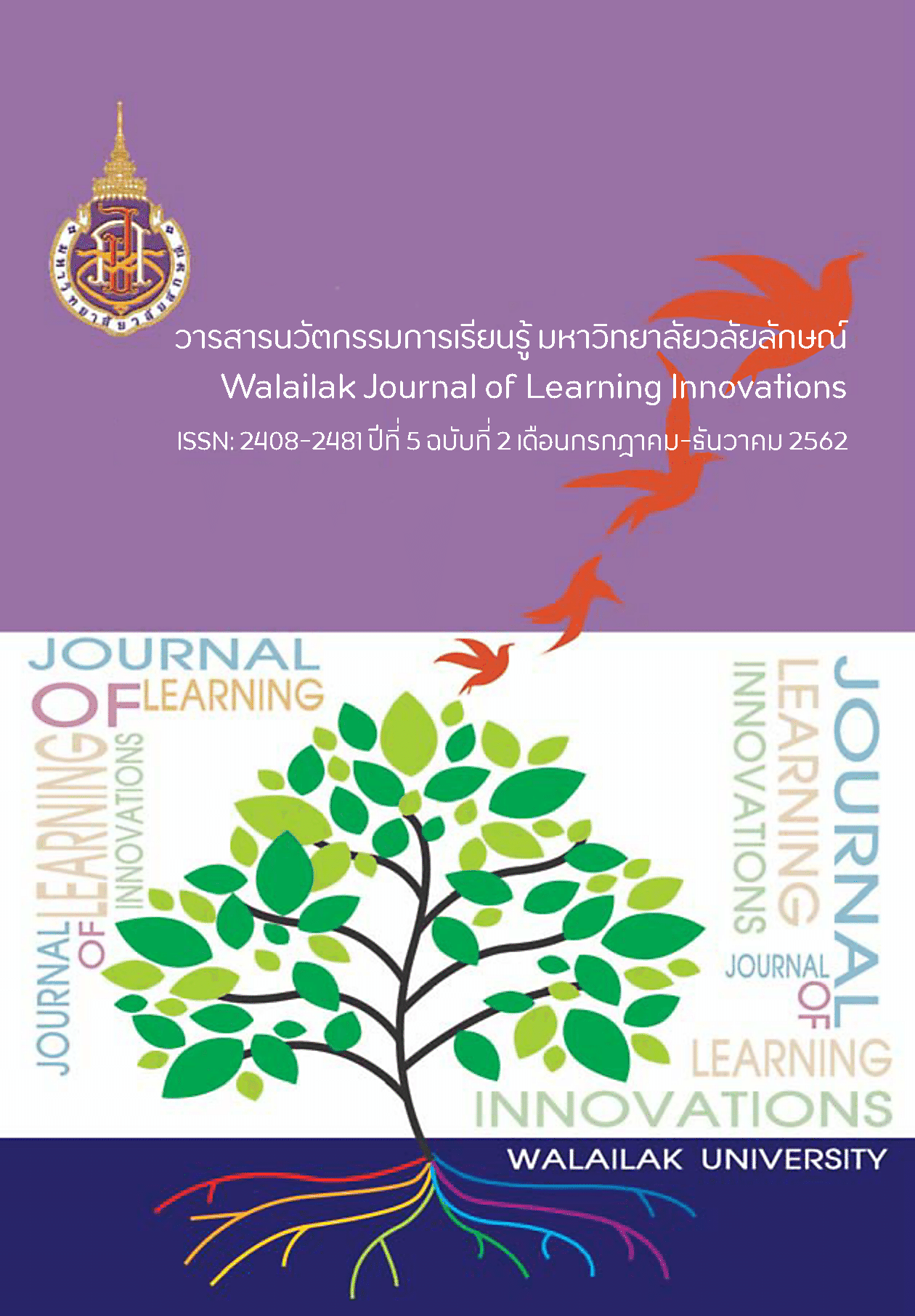Students’ perceptions of the use of Kahoot, Padlet and Poll-Everywhere applications on a Contemporary Sexuality Course at Walailak University, Thailand
DOI:
https://doi.org/10.14456/jli.2019.11Keywords:
Students’ perceptions, Digital Formative Assessment Tools, Contemporary Sexuality, Experiential LearningAbstract
This paper discusses a case study where digital formative assessment tools were used on a Contemporary Sexuality course at Walailak University. The purpose of the study was to investigate students’ perceptions of the following tools: Kahoot, Padlet, and Poll-Everywhere. Twenty-five undergraduate students (purposive sampling) who had registered on the course in the second semester of 2017 completed a questionnaire. The three digital formative assessment tools were applied with an experiential learning (EL) approach to increase students’ engagement and enhance learning outcomes. The results showed students’ perceptions of using online digital tools as part of the EL approach was generally positive, with Kahoot being the most favorable application, followed by Padlet and then Poll-Everywhere. An overall evaluation of the use of digital formative assessment tools showed that the mean rating given by students on a five-point scale was 4.56 (n=25, SD=0.65). The course was therefore well received. The students found the digital tools very useful for mastering the content. Additionally, an analysis of open-ended survey responses clarified the different merits students perceived as arising from each activity. The variations provided by the experiential learning design of the course served to meet their learning needs and were experienced as fun.
References
Cano, E. & G. Ion. 2016. Innovative practices for higher education assessment and measurement. IGI Global.
Chaiyo, Y. & R. Nokham. 2017. The effect of Kahoot, Quizizz and Google Forms on the student's perception in the classrooms response system. In Digital Arts, Media and Technology (ICDAMT), International Conference on, 178-182. IEEE.
Dellos, R. 2015. Kahoot! A digital game resource for learning. International Journal of Instructional Technology and Distance Learning, 12, 49-52.
Drexler, W. 2010. The networked student model for construction of personal learning environments: Balancing teacher control and student autonomy. Australasian Journal of Educational Technology, 26.
Dunbar, L. 2017. Using padlet to increase student interaction with music concepts. General Music Today, 30, 26-29.
Elliott, J. 2017. Using Mobile Technology for Formative Assessment in the Classroom. Handbook of Research on Mobile Devices and Smart Gadgets in K-12 Education, 308-320.
Hsiung, W. Y. 2018. Interactive and Engaging Module Sites: The RASA Model. In Redesigning Learning for Greater Social Impact, 197-204. Springer.
Ismail, M. A.-A. & J. A.-M. Mohammad. 2017. Kahoot: A Promising Tool for Formative Assessment in Medical Education. Education in Medicine Journal, 9, 19-26.
Lewis, L. H. & C. J. Williams.1994. Experiential learning: Past and present. New directions for adult and continuing education, 1994, 5-16.
Meyers, C. & T. B. Jones. 1993. Promoting Active Learning. Strategies for the College Classroom. ERIC.
Miyazoe, T. & T. Anderson.2010. Learning outcomes and students' perceptions of online writing: Simultaneous implementation of a forum, blog, and wiki in an EFL blended learning setting. System, 38, 185-199.
Sağlam, A. 2017. Chapter 20 The integration of educational technology for classroom-based formative assessment to empower teaching and learning. In Handbook of Research on Mobile Devices and Smart Gadgets in K-12 Education, 321-341. IGI Global.
Yapıcı, İ. Ü. & F. Karakoyun. 2017. Gamification in Biology Teaching: A Sample of Kahoot Application. Turkish Online Journal of Qualitative Inquiry, 8, 396-414.
Downloads
Published
How to Cite
Issue
Section
License
เนื้อหาและข้อมูลในบทความที่ลงตีพิมพ์ในวารสารนวัตกรรมการเรียนรู้ มหาวิทยาลัยวลัยลักษณ์ ถือเป็นข้อคิดเห็นและความรับผิดชอบของผู้เขียนบทความโดยตรง ซึ่งกองบรรณาธิการวารสาร ไม่จำเป็นต้องเห็นด้วย หรือร่วมรับผิดชอบใดๆ
บทความ ข้อมูล เนื้อหา รูปภาพ ฯลฯ ที่ได้รับการตีพิมพ์ในวารสารนวัตกรรมการเรียนรู้ มหาวิทยาลัยวลัยลักษณ์ ถือเป็นลิขสิทธิ์ของวารสารนวัตกรรมการเรียนรุ้ มหาวิทยาลัยวลัยลักษณ์ หากบุคคลหรือหน่วยงานใดต้องการนำทั้งหมดหรือส่วนหนึ่งส่วนใดไปเผยแพร่ต่อเพื่อกระทำการใดๆ จ้อต้องได้รับอนุญาตเป็นลายลักษณ์อักษรจากวารสารนวัตกรรมการเรียนรู้ มหาวิทยาลัยวลัยลักษณ์ก่อนเท่านั้น

